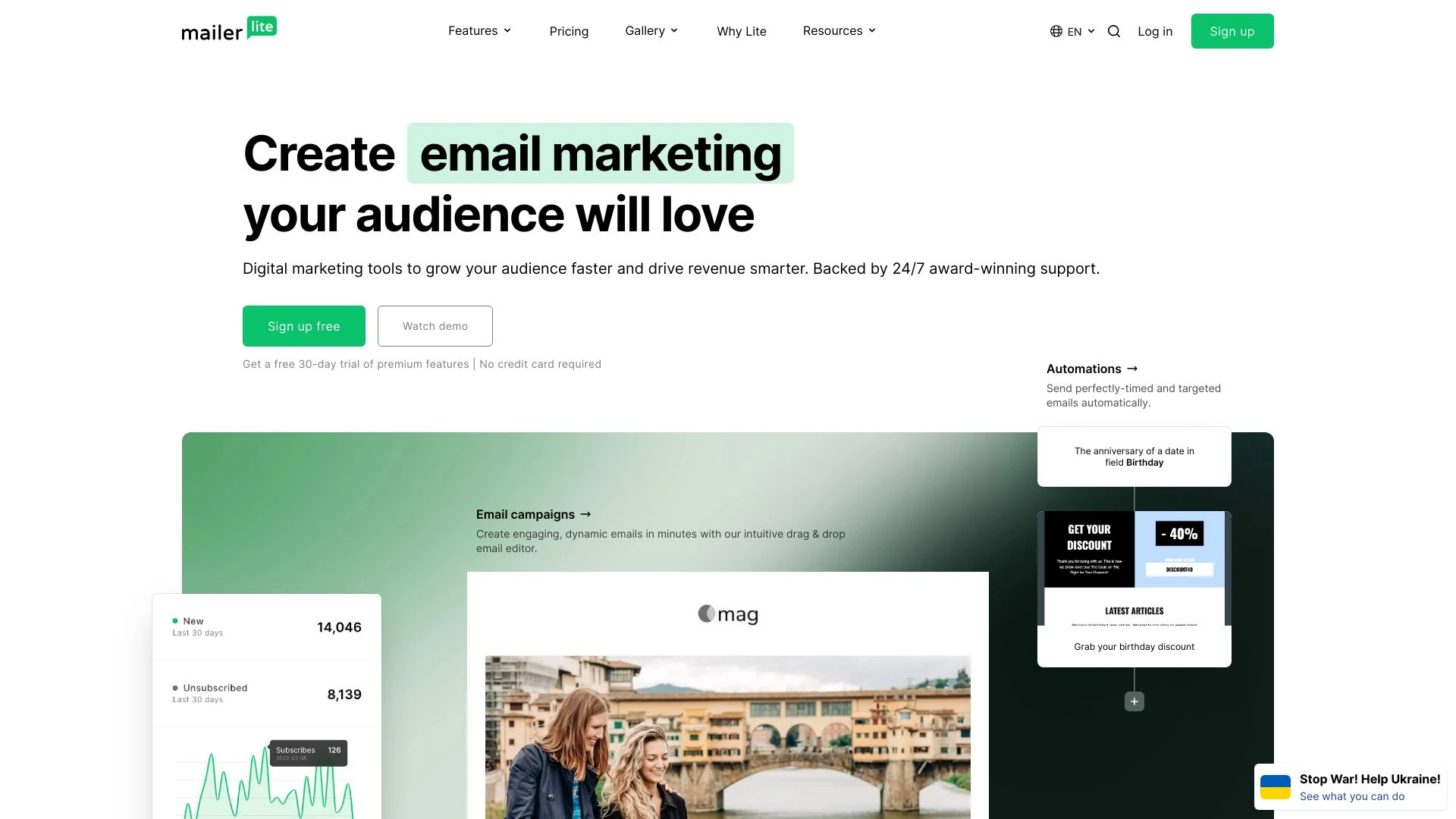Mailchimp versus MailerLite
Mailchimp, launched in 2001, is a robust email marketing platform ideal for small to medium-sized businesses, offering diverse tools like automation, CRM, and advanced analytics. MailerLite, founded in 2010, targets startups and bloggers, providing user-friendly features for creating campaigns with a focus on simplicity and affordability. Both serve distinct yet overlapping audiences.


Mailchimp
Ideal For
E-commerce and retail marketing
Customer relationship management
Startup promotional campaigns
Freelance project marketing
Key Strengths
User-friendly interface
Comprehensive analytics
Multiple marketing channel support
Core Features
Email marketing
Marketing automation
Audience management
Reporting & analytics
Custom templates
MailerLite
Ideal For
Growing your email subscriber base
Automating marketing workflows
Designing compelling newsletters
Enhancing customer engagement with personalized emails
Key Strengths
User-friendly interface
Comprehensive features for email and website marketing
Automation capabilities save time
Core Features
Email marketing campaigns
Automation for targeted emails
Drag & drop email editor
Website and landing page builder
Lead collection forms
Popularity
Decision Matrix
| Factor | Mailchimp | MailerLite |
|---|---|---|
| Ease of Use |
|
|
| Features |
|
|
| Value for Money |
|
|
| Interface Design |
|
|
| Learning Curve |
|
|
| Customization Options |
|
|
Quick Decision Guide
- You want easy email campaign automation.
- You aim for powerful audience segmentation tools.
- You value insightful analytics and reporting features.
- You look for a user-friendly drag-and-drop editor.
- You want access to a vast library of templates.
- You want an intuitive and user-friendly interface.
- You aim to create stunning email campaigns effortlessly.
- You value robust automation features for better targeting.
- You look for affordable pricing with powerful tools included.
- You want excellent customer support and resources available.
What Our Experts Say
Mailchimp excels in advanced automation and integrations, making it ideal for larger businesses needing complex campaigns. It offers a wider range of tools but can be pricey. In contrast, MailerLite shines for small to medium-sized enterprises seeking simplicity and cost-effectiveness, delivering great results in engagement and user-friendly design. Both tools face integration issues; however, MailerLite generally offers smoother onboarding and setup.
Jamie Davis
Software Analyst
At a Glance
Mailchimp offers advanced automation and extensive integration options, suitable for large businesses, but can be pricier. MailerLite excels in user-friendliness, affordability, and strong customer support, making it ideal for startups and small businesses. Pros for Mailchimp: robust features, diverse integrations. Cons: cost. Pros for MailerLite: user-friendly, cost-effective. Cons: fewer advanced features. Choose Mailchimp for complexity; MailerLite for simplicity.
Pricing and Subscription Plans
Mailchimp offers a Free plan for up to 500 subscribers, with paid plans starting at $10/month for 500 subscribers, scaling based on features like marketing automation. MailerLite has a Free plan for up to 1,000 subscribers, with paid plans starting at $10/month for 1,000 subscribers, offering unlimited emails. MailerLite is generally more cost-effective for small businesses needing essential features without hidden fees.
Performance Metrics
Mailchimp offers robust analytics with advanced A/B testing, leading in accuracy for audience segmentation. While MailerLite excels in speed, particularly for campaigns with large lists, it may lag in extensive reporting features. For high-volume sends, MailerLite can outperform Mailchimp in reliability, but for detailed metrics, Mailchimp is preferred.
User Experience
Mailchimp offers a visually appealing interface with a steep learning curve, making it suitable for experienced users. Its navigation is straightforward, but advanced features may overwhelm beginners. MailerLite, on the other hand, boasts a simpler interface and easier navigation, promoting quick user adoption. Customizability is strong in both platforms, but MailerLite is more user-friendly. Support resources are robust for both, though MailerLite's help center is often praised for clarity.
Integrations and Compatibility
Mailchimp offers extensive integrations with over 300 apps, including Shopify, WordPress, and Salesforce. MailerLite supports fewer integrations but includes key apps like WooCommerce and Zapier. Both platforms provide API access for custom workflows, enhancing versatility.
Limitations and Drawbacks
Mailchimp's limitations include higher costs for advanced features and a less intuitive interface. MailerLite lacks advanced automation and has limited integrations. Workarounds for Mailchimp include using templates for efficiency, while MailerLite can improve with third-party tools.